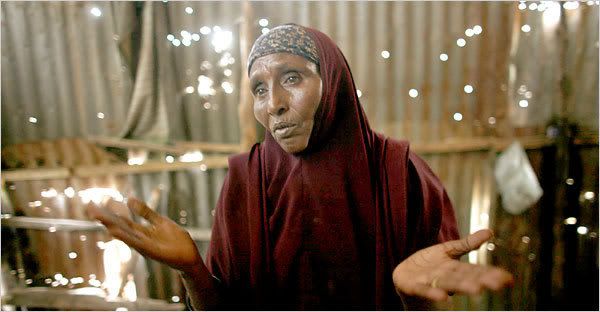
Halima, a resident of Somalia's capital, Mogadishu, is the distraught mother of a 22-year-old militiaman hit in the brain by a bullet. Behind her, a wall in her home is ridden with bullet holes from neighborhood fighting. Photo credit: Michael Kamber for The New York Times.
This situation in Somalia is truly gut-wrenching.
A week ago, Yoonis Issay Alin was riding around in the back of a pickup, part of a squad of tough-looking guys with big trucks and big guns.
Now he is drooling on a metal cot, shot in the head over a parking spot.
All around him at Medina Hospital in Mogadishu, Somalia’s capital, young men writhe in steamy beds, their arms and legs trapped in traction ropes, their gunshot wounds the latest proof of a society out of control. It is hard to imagine there is enough gauze in this broken-down country to keep up.
[...]
His skull is encased in a helmet of white medical tape. He has been drifting in and out of consciousness, and doctors say they have no way to gauge the amount of brain damage.
“There are no neurosurgeons here, no M.R.I.’s, no CAT scans, no psychiatrists,” said Sheikhdon Salad Elmi, director of Medina Hospital. “Can you imagine that? In a city where everyone needs therapy, not a single psychiatrist?”
Deplorable. This situation seems like it could be controlled with a minimal amount of effort compared to the bloodshed in Iraq for instance. The few who are doing anything don't seem to be doing enough.
Diplomats see international peacekeepers as the only way to stabilize Somalia once Ethiopian troops -- who helped the interim government oust rival Islamists over the New Year and are now propping up the administration -- return home.
But with Uganda the only country to pledge troops publicly, funding uncertain and African politicians clearly wary of a messy engagement in a nation in anarchy since 1991, many think it will be a long and difficult task to muster such a force.

No comments:
Post a Comment